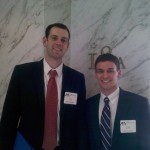Congratulations to the 2013 Jenkins Semifinalists
Congratulations to this year’s Jenkins Honors Moot Court Competition semifinalists: Michael Beckman, Kelly Cavey, Paul Jonas, Brittany Kachingwe, Hans Lodge, Tea Norfolk, Kerri Puig, and Robert Steele. Teams are advancing after four rounds of preliminary competition.
Thank you to the numerous judges who graded briefs and heard oral arguments, as well as to all the competitors, who prepared hard for the competition and fought good battles this weekend.
The semifinal round will be held on March 27 at 6:30 p.m. The teams will be matched as follows:
Brittany Kachingwe and Paul Jonas v. Tea Norfolk and Kelly Cavey in the Appellate Courtroom.
Kerri Puig and Robert Steele v. Hans Lodge and Michael Beckman will argue in the Trial Courtroom.
Good luck to the semifinalists.

